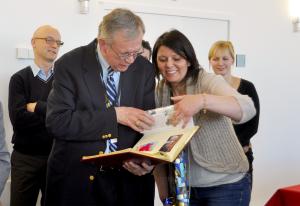Rich Hawryluk reflects on his years at ITER
29 Apr 2013
-
John Greenwald, Princeton Plasma Physics Laboratory
A senior scientist at PPPL, Rich Hawryluk (here with Assistant Caroline Vaxelaire at his farewell party on 15 March 2013) did a two-year stint as ITER Deputy Director-General and Director of the Administration Department.
What is it like to be at the centre of ITER, the huge international fusion experiment that is under construction in France? "It's both exciting and challenging," said physicist Rich Hawryluk, who recently returned to the Princeton Plasma Physics Laboratory (PPPL) in the US after a two-year stint as deputy director-general for the Administration Department of ITER. "It's exciting in the scope and scale of this effort, and challenging in bringing such a large project to completion."
Hawryluk had many diverse responsibilities at ITER. He oversaw functions ranging from human resources to finance and budgeting to procurement and information technology. "A project this large is almost a continuous cycle of oversight and reviews," said Hawryluk. "You're essentially going from one major review to another every few months, and this kept us extremely busy."
Hawryluk arrived at ITER in April 2011, a year after construction of the ITER complex began on a 180-hectare site in 2010. Contracts now are being prepared and awarded to assemble the six-storey-tall fusion facility, or Tokamak Building, that will be at the heart of the complex.
Hawryluk is no stranger to exhaustive oversight duties. He served as head of PPPL's Tokamak Fusion Test Reactor experiment from 1991 to 1997 and as deputy director of PPPL from 1997 to 2008. He also was a member of the US delegation to the ITER Management Advisory Committee, which reports to the ITER Council. "But there's a big difference between being an outsider on the advisory committee and dealing with day-to-day issues," he said. "Getting immersed in and resolving the many issues that we had talked about was a major change."


